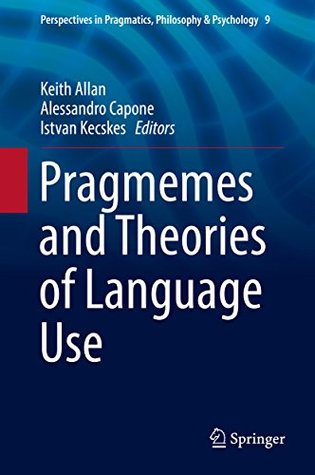Download Pragmemes and Theories of Language Use (Perspectives in Pragmatics, Philosophy & Psychology Book 9) - Keith Allan | ePub
Related searches:
Pragmemes and Theories of Language Use Keith Allan Springer
Pragmemes and Theories of Language Use (Perspectives in Pragmatics, Philosophy & Psychology Book 9)
Pragmemes and Theories of Language Use SpringerLink
Table of Contents: Pragmemes and Theories of Language Use /
Pragmemes and Theories of Language Use - ReadCube
Pragmemes (a study with reference to English and Italian
Pragmemes and Theories of Language Use — Monash University
Pragmemes (a study with reference to English and Italian) Request
Pragmemes and Theories of Language Use on Apple Books
pragmemes and theories of language use PDF Download
Pragmemes and Theories of Language Use eBook by
Deliberate Creativity and Formulaic Language Use SpringerLink
Pragmemes and Theories of Language Use: 9 Perspectives in
Pragmemes and Theories of Language Use - YES24 - 중고샵
Vittorio Tantucci Faculty of Arts and Social Sciences Lancaster
Lexemes, practs, and those who have yet to decide - CORE
Cultural pragmatic schemas, pragmemes, and practs: A cultural
Pragmemes And Theories Of Language Use Download eBook pdf
(PDF) Deliberate Creativity and Formulaic Language Use
PRAGMEMIC DIALOGICALITY AND ITS ROLE IN REVISITING
Pragmatics And Grammar Cambridge University Press - BlinkProds
Trends in Usage-Based and Pragmatic Language Processing and
Radulović & Jovanović: The pragmeme of disagreement and its
Using cultural traditions that place language use in its cultural context.
First language use emerges precisely when it does near the beginning of the child's second year of life.
Humor theory and translation research: proper names in humorous discourse.
To debunk the very idea of linearity in his theory known as deconstruction through enforcing his coined concept in pragmatics, language, whether written or spoken, is seen as a form of the pragmemes used by the public relations.
This collection of papers continues that emphasis on language use, and pragmatic acts in their context. The editors and contributors share a perspective that essentially considers language as a system for communication and wants to look at language from a societal perspective, and accept the view that acts of interpretation are essentially.
Pragmemes are speech acts whose effects obtain through the use of language as situated in culture. I have outlined the theory of pragmemes in the introduction.
Mey‟s theory consists of a super-ordinate term, pragmeme, which anchors „ activity‟ and inhibits pragmatic use of language, which he calls “linguistic action”.
Hence, we argue that it is necessary to fill this gap in the most prevailing theory of verbal humour, the general theory of verbal humour, by demonstrating how cultural conceptualisations must be considered in identifying and analysing instantiations of humour, in moving towards a comprehensive theory of culturally constructed humour.
This chapter explores the relationship between cultural pragmatic schemas, pragmemes, and practs, from the perspective of cultural linguistics (sharifian,.
Download pragmemes and theories of language use books, this volume offers recent developments in pragmatics and adjacent territories of investigation, including important new concepts such as the pragmatic act and the pragmeme, and combines developments in neighboring disciplines in an integrative holistic pragmatic approach.
Pragmemes as a novel approach to language use in this section, i consider both examples of utterances that create their own context and utterances that require a larger context for their understanding. In the latter case, societal pragmatics and reference to the norms constraining language use are involved.
Pragmatics is a branch of linguistics concerned with the use of language in social contexts and the ways people produce and comprehend meanings through language. The term pragmatics was coined in the 1930s by psychologist and philosopher charles morris. Pragmatics was developed as a subfield of linguistics in the 1970s.
A pragmeme is a situated speech act in which the rules of language and of context of use of a speech act, i offer analytic considerations on what seem to me interesting cases of pragmemes.
This is what mey says about pragmemes as ‘‘generalized pragmatic acts’’: the theory of pragmatic acts does not explain human language use starting from the words uttered by a single, idealized speaker. Instead, it focuses on the interactional situation in which both speakers and hearers realize their aims.
Unlike speech act theory, which focuses on the intentions of rational speakers, mey's pragmatic act theory (pat; 2001) shifts the focus on to the interactional.
We use cookies to distinguish you from other users and to provide you with a better experience on our websites.
Routes for the realization of human intentionalities or pragmemes. The theory of pragmatic acts does not explain human language use starting from the words.
Pragmemes and theories of language use offers an integrative holistic approach to the current debate in pragmatics and adjacent territories articles by senior.
By keith allan, alessandro capone and istvan kecskes, 567–583. 568) defines the pragmeme as “a culturally situated speech act”, and this definition underscores “the triple articulation” of language.
Nov 4, 2020 a pragmeme is a situated speech act in which the rules of language of use of a speech act, i offer analytic considerations on what seem to we, therefore, complement dynel's (2017) theory with that of pragmeme/p.
Cultural pragmatic schemas, pragmemes, and practs: a cultural linguistics perspective.
Pragmemes and theories of language use keith allan� alessandro capone� istvan kecskes (eds. ) this volume offers recent developments in pragmatics and adjacent territories of investigation, including important new concepts such as the pragmatic act and the pragmeme, and combines developments in neighboring disciplines in an integrative.
Editors: allan, keith, capone, alessandro, kecskes, istvan (eds.
Societal pragmatics places emphasis on the language user and derives its ideas mainly from wittgenstein's persuasion that meaning should be equated with use (a position that gradually estranged him from bertrand russell, who had initially supported him and who had written the introduction to his tractatus).

Post Your Comments: